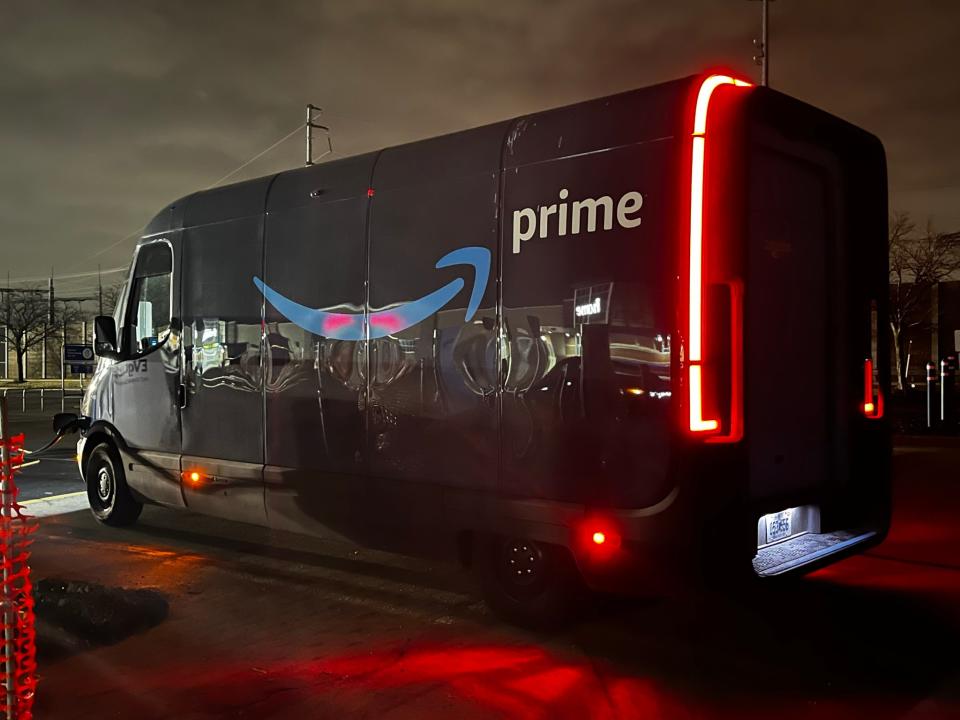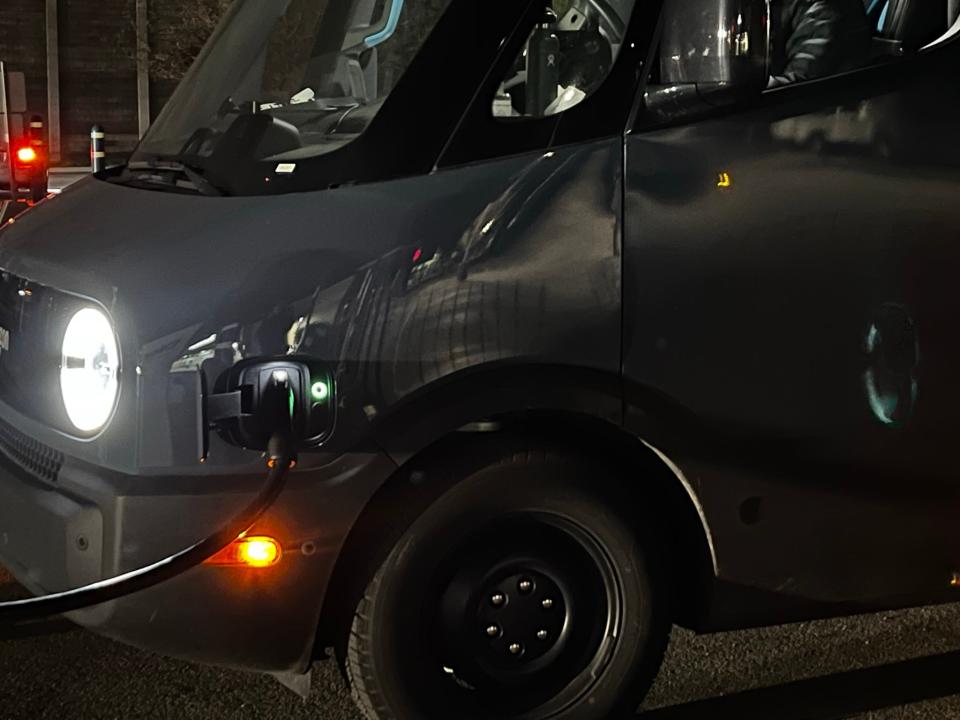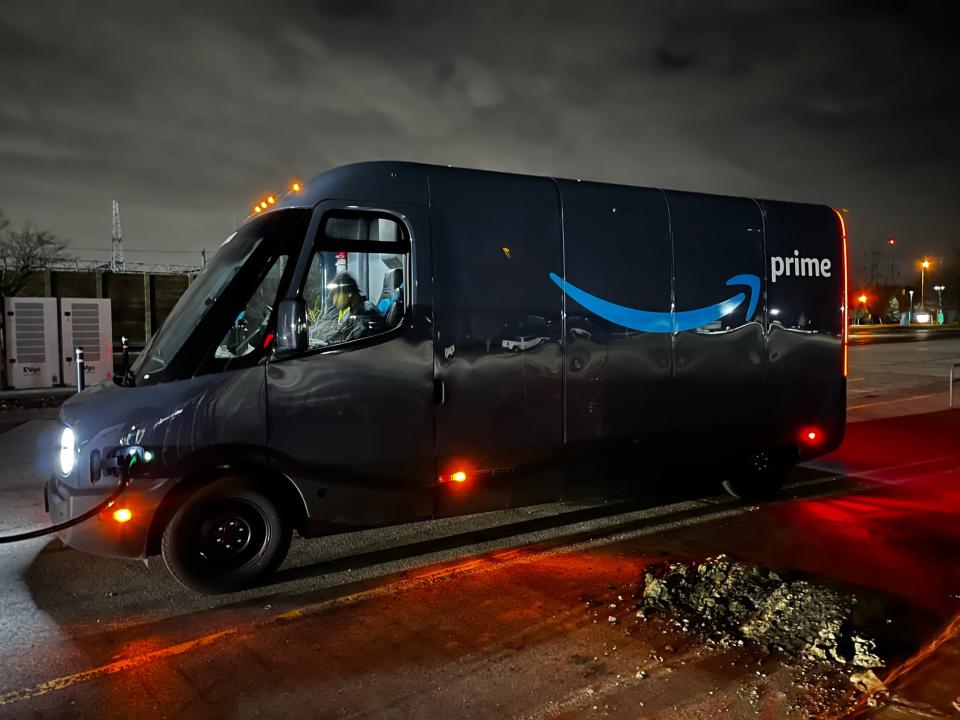Electric Amazon vans spotted around metro Detroit are carrying trade secrets, not goods

Electric vehicle drivers are finding themselves with unexpectedly large neighbors at DC fast charging stations around metro Detroit this holiday season. What they are seeing: electric Amazon delivery vans, undergoing final testing on public roads.
The blue-gray vans are doing simulated work shifts, according to sources with knowledge of the program but who are not authorized to speak publicly about it. They spend eight hours or more driving through neighborhoods and major roads, stopping perhaps 200 times a night to simulate deliveries. The drivers even get out and walk away to make sure the van’s proximity sensors recognize their departure and activate security systems to protect the cargo a vehicle in regular service would carry.
They stop and charge at public high-voltage DC chargers about once a shift. That’s the only part of the routine that doesn’t mirror the vans’ expected work cycles.
Amazon will have its own charging hookups at depots and collection centers, so its vehicles don’t hog public chargers, potentially alienating customers and the general public, if anybody’s left who isn’t an Amazon customer: “Sorry I’m late. I got stuck in line behind an Amazon truck at the charger.”
A Motor City staple
The test vans rolling around Detroit are carrying precise data-gathering equipment, not delivering Amazon’s plethora of goods.

Commonplace on Michigan roads, development vehicles like these are unheard of and nearly never seen in most of the world. Frequently disguised by fitted vinyl panels with black-and-white geometric patterns to disguise design details, they’re part of the scenery in the Motor City.
The Amazon vans, built by Rivian and likely based at the company’s engineering center in Plymouth, a suburb on the west side of Detroit, are undisguised. Amazon invested $700 million in Rivian and committed to buying 100,000 vans from Rivian over a period of years in 2019. Painted blue-gray, recognizable by white running lights that ring their headlights and the lack of an exhaust pipe, they bear Amazon’s familiar stylized smile.
They’re delivery vans after all. What’s to disguise?
Innovations and trade secrets are inside: the battery under the cargo floor, the electric motors and other features.

Mark Phelan:Mercedes regains its magic with electric EQS 580 luxury sedan
More:GM, Ford, Stellantis need to step up to save Detroit auto show
What are they testing for?
Automakers have development vehicles like this on the road around the clock all over the world. The vehicles and their drivers do much more than simply accumulate miles to demonstrate durability.
Neither Amazon nor Rivian responded to requests for comment on this story.
One company, Roush Performance, puts dozens of vehicles in North and South America, Europe and Asia through on-road tests on any given day. Contractually prohibited from naming its clients, or discussing work done specifically for any of them, Roush creates and executes evaluation programs for virtually every system and feature in a vehicle, said Jason Furr, vice president of business development. The company even creates the anonymizing black and white camo sheets that disguise so many vehicles until they’re officially revealed.
“Testing is part of any product development and life cycle program,” Furr said. “Our drivers monitor and record issues so they can be resolved before they get into production."
Roush has six test centers across the United States to test vehicles in climates ranging from southern swamps to Rocky Mountain heights, desert heat, frigid winters and torrential rain.
“Companies have realized that computer modeling and simulations will only get you so far,” Furr said. “You have to log the miles on pavement. We’ve worked with most major automakers and startups around the world.”

The vehicles are heavily instrumented, but the drivers take notes throughout their shifts so there’s both a digital and human record of what happened and when.
No two tests are identical. “Maybe the objective is driver assistance systems,” such as automatic braking or hands-free driving, Furr said. “You have to put the vehicle in situations that test and confirm the performance of those systems.
“Some of the tests are just accumulating miles, but more often we test specific systems in repeatable ways.”
Roush also provides other engineering services, builds performance vehicles like the Roush Trak Pak Mustang, does aerospace and military engineering and even develops and assembles rides for amusement parks.
Contact Mark Phelan: mmphelan@freepress.com. Follow him on Twitter @mark_phelan. Read more on autos and sign up for our autos newsletter. Become a subscriber.
This article originally appeared on Detroit Free Press: Amazon-Rivian electric vans getting real-world test on Michigan roads
